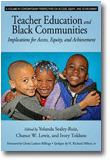
Teacher Education and Black Communities
Implications for Access, Equity and Achievement
Edited by:
Yolanda Sealey-Ruiz, Teachers College, Columbia University
Chance W. Lewis, University of North Carolina at Charlotte
Ivory Toldson, Howard University
A volume in the series: Contemporary Perspectives on Access, Equity, and Achievement. Editor(s): Chance W. Lewis, University of North Carolina at Charlotte.
Published 2014
The field of education has been and will continue to be essential to the survival and sustainability of the Black community. Unfortunately, over the past five decades, two major trends have become clearly evident in the Black community: (a) the decline of the academic achievement levels of Black students and (b) the disappearance of Black teachers, particularly Black males. Today, of the 3.5 million teachers in America’s classrooms (AACTE, 2010) only 8% are Black teachers, and approximately 2% of these teachers are Black males (NCES, 2010). Over the past few decades, the Black teaching force in the U.S. has dropped significantly (Lewis, 2006; Lewis, Bonner, Byrd, & James, 2008; Milner & Howard, 2004), and this educational crisis shows no signs of ending in the near future. As the population of Black students in K-12 schools in the U. S. continue to rise—currently over 16% of students in America’s schools are Black (NCES, 2010)—there is an urgent need to increase the presence of Black educators.
The overall purpose of this edited volume is to stimulate thought and discussion among diverse audiences (e.g., policymakers, practitioners, and educational researchers) who are concerned about the performance of Black students in our nation’s schools, and to provide evidence-based strategies to expand our nation’s pool of Black teachers. To this end, it is our hope that this book will contribute to the teacher education literature and will inform the teacher education policy and practice debate.
CONTENTS
Foreword: Teacher Education and the Black Communities, Gloria Ladson-Billings. Acknowledgements. Introduction, Yolanda Sealey-Ruiz, Chance W. Lewis. Part I: Preparing Teachers to Teach Black Students. Preparing Teachers to Teach Black Students: A Story About a Journey to Teaching Excellence, Suzanne C. Carothers. Insights for Future Educators on Promoting Nonresident Black Father Involvement in Schools, Increasing Black Student Achievement, and Advancing Equity in Education, Brianna P. Lemmons. Making Space for Black Queer Teachers: Pedagogic Possibilities, Lance T. McCready and Micia Mosely. New Visions of Collective Achievement: The Cross-Generational Schooling Experiences of African American Males, Darrell Cleveland Hucks. Young Scholars: African American Males and Academic Identity Development, Robert W. Simmons, III, Cheryl Moore-Thomas, and Audra Watson. Invisible Hands Seeing and Noticing Black and Latino Male Youth, Yolanda Sealey-Ruiz, Keisha Allen and Erik Nolan. Not Strangers: How Social Distance Influences Black Male Teachers’ Perceptions of Their Male Students of Color, Travis J. Bristol. Part II: Preparing Black Students to Become Teachers. Teachers and Teaching for the New Millennium, Jacqueline Jordan Irvine and Leslie T. Fenwick. Mending the Pipeline: Recruitment and Retention of African American Preservice Teachers in a Predominantly White Institution, David A. Byrd and Shailen M. Singh. Human Capital Investment: Supporting the Development of Visionary Change Agents in Teacher Preparation Programs for Urban Schools and Communities, Derrick Robinson, Ayana Allen, and Chance W. Lewis. An Evaluation of an In-House Coaching Pilot Study within the Institute of Education, University of London: 20–20 Coaching TDA Project for the Recruitment and Retention of Black Minority Ethnic Student Teachers, Victoria Showunmi. Bad Boys to Master Teachers: Hip Hop Culture and the Making of Black Male Teacher Identity, Thurman Bridges. The Legacy Lives, “I leave you a thirst for education”—Dr. Bethune’s Vision in Action: A Study of the Impact of an HBCU on Teachers and Educational Leaders, Tehia Starker Glass, Helena Mariella-Walrond, Allyson Leggett Watson, and Lakia M. Scott. Part III: Implications For Access, Equity, And Achievement. The Contextual Factor of Race in Equity, Access, and Achievement, Marvin Lynn. Equity in Opportunities to Learn Mathematics: Policy and Practice Implications for High-Achieving Black Students, Kenneth Alonzo Anderson. Using Observation Prompts in the Urban Elementary School Field Placement, Felicia Moore Mensah. Collateral Damage in the Classroom: How Race and School Environment Influence Teachers’ Attitudes and Behaviors Toward Their Students, Ivory A. Toldson and Mercedes E. Ebanks. Epilogue: Teacher Education and Black Communities, H. Richard Milner, IV. About the Editors. About the Contributors.
-
Paperback9781623966973
Web price: $45.04 (Reg. 52.99)
-
Hardcover9781623966980
Web price: $80.74 (Reg. 94.99)
- eBook9781623966997

-
 Advancing Inclusive Excellence in Higher Education
Practical Approaches to Promoting Diversity, Equity, Inclusion, and Belonging
Advancing Inclusive Excellence in Higher Education
Practical Approaches to Promoting Diversity, Equity, Inclusion, and Belonging
-
 Developing Culturally Responsive Learning Environments in Postsecondary Education
Developing Culturally Responsive Learning Environments in Postsecondary Education
-
 Economic, Political and Legal Solutions to Critical Issues in Urban Education and Implications for Teacher Preparation
Economic, Political and Legal Solutions to Critical Issues in Urban Education and Implications for Teacher Preparation
-
 Imagining the Future
Historically Black Colleges and Universities - A Matter of Survival
Imagining the Future
Historically Black Colleges and Universities - A Matter of Survival
-
 Post-Secondary Planning for All
Approaches to College and Career Readiness Counseling for Special Populations
Post-Secondary Planning for All
Approaches to College and Career Readiness Counseling for Special Populations
-
 Preparing to Lead
Narratives of Aspiring School Leaders in a "Post"-COVID World
Preparing to Lead
Narratives of Aspiring School Leaders in a "Post"-COVID World
-
 Unveiling the Cloak of Invisibility
Why Black Males are Absent in STEM Disciplines
Unveiling the Cloak of Invisibility
Why Black Males are Absent in STEM Disciplines

